|
|
|
Sort Order |
|
|
|
Items / Page
|
|
|
|
|
|
|
| Srl | Item |
| 1 |
ID:
168062
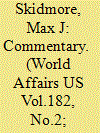

|
|
|
|
|
| Summary/Abstract |
This article directly and bluntly challenges traditional thought by casting aside conventional wisdom regarding the national economy, replacing it with Modern Political Economy and Public Policy. American national policies, I argue, should always, whenever possible, be universal, not targeted toward specific groups. Moreover, policies need to be crafted to achieve their goals, not to fit within budgetary constraints. The least government is the worst, not the best, and a miserly approach to spending is not “wise use of the taxpayers’ dollars.” The national government controls the currency, paying its bills in dollars. It issues dollars as needed, in whatever amount it chooses, and is unrestrained by the need to “find the money” or “pay-as-you-go.” Taxes are useful for purposes of regulation and control of income inequality, but are not relevant to expenditures. “Anything that is technically feasible,” I claim following Kelton and coauthors, “is financially affordable,” and there is no need to fear inflation so long as spending does not exceed the productive capacity of the economy. Despite conventional wisdom to the contrary, and regardless of the widely used jargon of politicians, when government spends, it is not using “The Taxpayers’ Money.”
|
|
|
|
|
|
|
|
|
|
|
|
|
|
|
|
| 2 |
ID:
117638
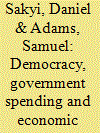

|
|
|
|
|
| Publication |
2012.
|
| Summary/Abstract |
Economic theory predicts a growth enhancing activities of various core functions of government. Nonetheless, government spending in non-democratic countries often goes beyond these core functions, namely into rent-seeking and non-productive activities. This paper employs the Autoregressive Distributed Lag bounds testing approach to cointegration to investigate the extent to which democracy and government spending have had an impact on economic growth in Ghana over the period 1960-2008. The empirical results obtained are encouraging, revealing support for the high effi ciency of government spending in democracies' hypothesis. The paper demonstrates that democracy and government spending go hand in hand to have a positive impact on economic growth in Ghana in both the long and short run. The fi ndings and policy recommendations of the paper provide vital information relevant for developing countries involved in the democratisation process.
|
|
|
|
|
|
|
|
|
|
|
|
|
|
|
|
| 3 |
ID:
192058
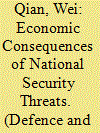

|
|
|
|
|
| Summary/Abstract |
This paper examines the impact of national security threats on a nation’s economic growth and fiscal policy based on a case study of the Korean peninsula. I construct four measures of provocations using a newly-assembled list of North Korean provocative events going back to 1960. The results show that the overall impact of North Korean provocations on South Korea’s short-run economic growth is negligible. Since inter-Korean relations have gone through four phases, this paper also estimates the impact of provocations over each subperiod. Provocations had a significant impact on South Korea’s economic growth during 1960-1970 and 1992-1997 when inter-Korean tensions were high, but the effects took on different signs. While provocations decreased South Korea’s economic growth during 1992-1997, it had a positive impact on South Korea’s macroeconomy before 1970. This paper provides evidence that the effect of national security threats may vary with the responses from the government and political factors such as the relation between the targeted country and the country that inflicts the threat.
|
|
|
|
|
|
|
|
|
|
|
|
|
|
|
|
| 4 |
ID:
182735
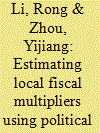

|
|
|
|
|
| Summary/Abstract |
We use political connections between central and local governments in China to identify the effects of government spending. Our key innovation is using changes of central government ministers as a source of exogenous variation in earmarked transfers received by prefectural city-level governments. The analysis reveals that the increase in earmarked transfers is temporary and local effective tax rates do not respond to such fiscal expansions. Given that using cross-regional analysis for a monetary union can difference out the influence of monetary policy, the fiscal shock we study is a temporary, non-tax financed and no-monetary-policy-response government spending shock. We find the local fiscal multiplier in China is above one and there are no significant spillover effects from local government spending.
|
|
|
|
|
|
|
|
|
|
|
|
|
|
|
|
| 5 |
ID:
101331
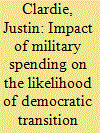

|
|
|
|
|
| Publication |
2011.
|
| Summary/Abstract |
Many countries complete tenuous transitions to democracy and must work to prevent an authoritarian reversal, which is often at the hands of the military. One of the most important tools the new government has in dealing with the military is the amount of money allocated to the military. This leads to the question, how does government military spending in post-transition democratic countries affect the chances of democratic transition failure? The extant literature provides two answers. The first is to increase military spending to placate the military; the second is to decrease military spending to weaken the military and address social welfare needs. The article tests these two hypotheses by examining democratic transitions from 1967 to 1999 using both logit and survival analysis methods. The results of the study provide robust support for the hypothesis that decreasing military spending decreases the likelihood of a democratic transition failure.
|
|
|
|
|
|
|
|
|
|
|
|
|
|
|
|
| 6 |
ID:
050373
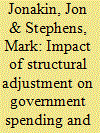

|
|
|
| 7 |
ID:
096155
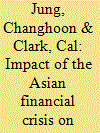

|
|
|
|
|
| Publication |
2010.
|
| Summary/Abstract |
The Republic of Korea was one of the major victims of the Asian Financial Crisis of 1997-98, but it recovered its economic dynamism quite quickly. In the short term, its budgetary response to near economic collapse was immediate and quite significant. The government increased spending and, once the peak of the crisis was over, taxes and expanded its previously very limited support of needy Koreans by substantially increasing funds for social development and for aiding local government. Thus, despite its being forced to accept a large International Monetary Fund (IMF) loan in late 1997, Korea clearly rejected the IMF model of fiscal austerity and governmental downsizing, giving a much higher priority to the welfare of its citizens. However, this short-term response to the devastating fallout from the crisis seems to have exacerbated several long-term challenges facing Korea. The liberal fiscal policy clearly contributed to the country's burgeoning debt problem, and there have been only limited attempts to improve the problems associated with public funds and special accounts. Unfortunately, political inertia makes a serious response to these long-term challenges unlikely in the near future.
|
|
|
|
|
|
|
|
|
|
|
|
|
|
|
|
| 8 |
ID:
127830
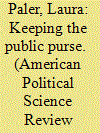

|
|
|
|
|
| Publication |
2013.
|
| Summary/Abstract |
It is widely believed that rents from windfall revenue undermine accountability. An enduring explanation is that windfalls free leaders from the need to tax, producing a quiescent population. Yet, there is little direct evidence of how windfalls and taxes affect citizen political action. I use novel revenue and information experiments to examine whether and why windfalls (compared to taxes) affect how citizens participate in politics. The experiments were embedded in a public awareness campaign conducted with 1,863 citizens in Indonesia. The results-from an original survey and postcard campaign-indicate that the tax treatment increased monitoring and anti-incumbent political action. Yet, when given spending information, citizens in the windfall treatment cared just as much about misused revenue as those in the tax treatment. The findings have important implications for understanding not only how revenue affects citizen political behavior but also how people acquire and process information on government spending
|
|
|
|
|
|
|
|
|
|
|
|
|
|
|
|
| 9 |
ID:
075226
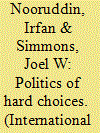

|
|
|
|
|
| Publication |
2006.
|
| Summary/Abstract |
A central component of International Monetary Fund (IMF) programs is reducing government budget deficits. We ask how domestic political considerations shape the distribution of cuts made by governments in IMF programs. Our central finding is that IMF programs shrink the role played by domestic politics. While democracies allocate larger shares of their budgets to public services in the absence of IMF programs, the difference between democracies and nondemocracies disappears under IMF programs. This result has important implications for our understanding of government spending priorities under different resource constraints.
|
|
|
|
|
|
|
|
|
|
|
|
|
|
|
|
| 10 |
ID:
092871
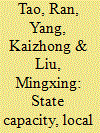

|
|
|
|
|
| Publication |
2009.
|
| Summary/Abstract |
Continued urban-rural income disparity poses a serious policy challenge in China's economic transition. As the Chinese economy booms and the state's fiscal capacity grows, there should be a corresponding increase in the center's capacity to redress urban-rural inequality. However, it seems that the stronger state extractive capacity since the mid-1990s has not translated into better urban-rural disparity outcomes. Based on a panel data set covering 270 prefectures in China between 1994 and 2003, the article evaluates the impact of local fiscal spending on urban-rural income disparity. Findings reveal a strong urban bias in China's local fiscal system under an increasingly centralized fiscal system. The centralized fiscal model has in fact reinforced this tendency and ironically weakened the capacity of the central state in achieving the policy goal of reducing the urban-rural divide.
|
|
|
|
|
|
|
|
|
|
|
|
|
|
|
|
| 11 |
ID:
181544
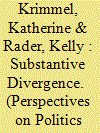

|
|
|
|
|
| Summary/Abstract |
We examine the substantive meaning of public opinion on government spending using open-ended data from an original survey. Belying the conventional wisdom on this subject, we find that public opinion on government spending is not reducible to views on social welfare programs. While most people do have specific associations with spending, in the aggregate, public associations span a wide range of government functions. Balance does not necessarily mean harmony, however. We find strong evidence of what we call substantive divergence along party lines in this area—when they think about spending, Republicans and Democrats envision different bundles of goods and services, on average. This is true even for opposing partisans with the same overall assessment of spending (e.g., those who say government spends too much). These findings bring fiscal conflict into sharper relief and also have broader implications for the conceptualization and measurement of differences across parties, as well as other political cleavages.
|
|
|
|
|
|
|
|
|
|
|
|
|
|
|
|
|
|
|
|
|